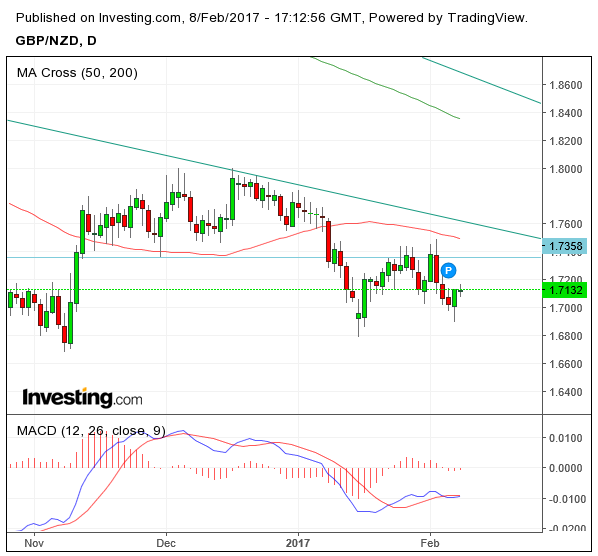New Zealand Dollar Slips as RBNZ Cuts Inflation Target

The New Zealand Dollar fell against the Pound and other currencies after the Reserve Bank of New Zealand (RBNZ) cut its inflation forecasts at its monthly policy meeting.
The RBNZ left its basic cash rate unchanged at 1.75%, as widely expected, but the statement released alongside the decision gave no hint that interest rate rises were in the pipeline.
The currency fell after the Bank revised its inflation profile lower at the 1 - 2 year horizon, with recent NZD strength being a major factor driving that revision.
Governor Wheeler noted that “policy may need to adjust accordingly.”
"Our economists continue to expect a 25bp cut this year, but the curve remains heavily skewed toward a hike," says Adam Cole at RBC Capital Markets.
As a result of the RBNZ event we now see the GBP/NZD exchange rate trading towards the top of its recent range at 1.7387.
Our technical analyst Joaquin Monfort points out that despite the recent jump there is still no clear bias either way from the charts and we await further confirmation for more clarity on which way the pair will break.
For now we would expect any strength in GBP/NZD to be limited towards the 1.7450 level as we expect selling interest to intensify at this point.
Despite the RBNZ revising lower inflation forecasts we cannot ignore the fact that the New Zealand economy remains one of the more robust developed economies and it is hard to argue against such fundamentals.
However, it is also worth bearing in mind research from RBC Capital Markets which shows a Q1 cyclical effect for the commodity currencies whereby they tend to weaken at the start of the year
This quirk is particularly true with regards to the NZD and as such we could see NZD weaken during the rest of the first quarter.
"There is good historical evidence that January moves in commodity currencies tend to reverse through February/March. NZD, in particular, reverses its January direction more than 70% of the time,” says RBC's Cole.
The Pound was meanwhile supported mid-week by more hawkish commentary from BOE’s Kirstin Forbes who said she thought interest rates should be raised soon.
This came as a shock to investors given the studied neutral tone of the recent meeting and the 0-7 vote in favour of keeping rates unchanged.
Higher interest rates mean a stronger pound as they attract more inbound investment from investors seeking higher returns.






